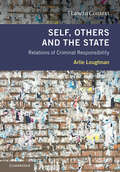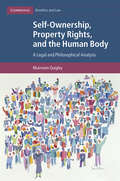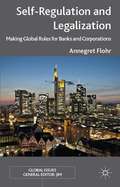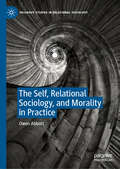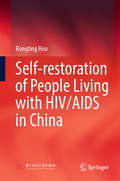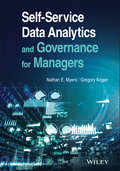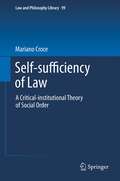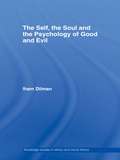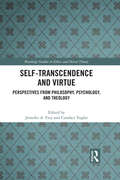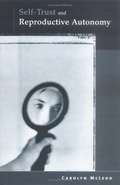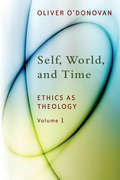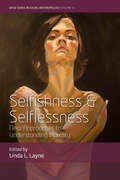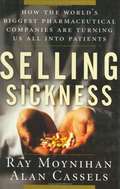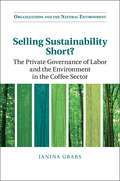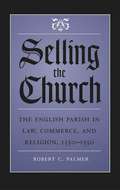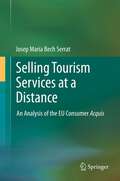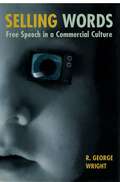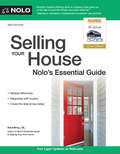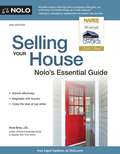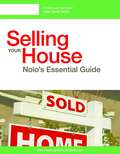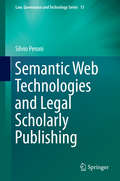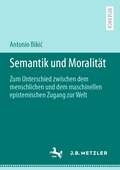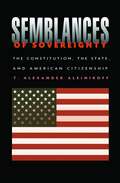- Table View
- List View
Self, Others and the State: Relations of Criminal Responsibility (Law in Context)
by Arlie LoughnanCriminal responsibility is now central to criminal law, but it is in need of re-examination. In the context of Australian criminal laws, Self, Others and the State reassesses the general assumptions made about the rise to prominence of criminal responsibility in the period since around the turn of the twentieth century. It reconsiders the role of criminal responsibility in criminal law, arguing that criminal responsibility is significant because it organises key sets of relations - between self, others and the state - as relations of responsibility. Detailed studies of decisive moments and developments since the turn of the twentieth century, and original explorations of relations of responsibility, expose the complexity and dynamism of criminal responsibility and reveal that it is the means by which matters of subjectivity, relationality and power make themselves felt in the criminal law.
Self-Ownership, Property Rights, and the Human Body: A Legal And Philosophical Analysis (Cambridge Bioethics And Law #43)
by Muireann QuigleyHow ought the law to deal with novel challenges regarding the use and control of human biomaterials?<P><P> As it stands the law is ill-equipped to deal with these. Quigley argues that advancing biotechnology means that the law must confront and move boundaries which it has constructed; in particular, those which delineate property from non-property in relation to biomaterials. <P>Drawing together often disparate strands of property discourse, she offers a philosophical and legal re-analysis of the law in relation to property in the body and biomaterials. She advances a new defence, underpinned by self-ownership, of the position that persons ought to be seen as the prima facie holders of property rights in their separated biomaterials. <P>This book will appeal to those interested in medical and property law, philosophy, bioethics, and health policy amongst others.<P> Includes a robust discussion of self-ownership and provides a new perspective to the legal literature.<P> Brings together legal and philosophical scholarship in the area and enriches the discourse by taking a wider and more integrated view.<P> Discusses in-depth the legislative and common law background by covering a number of jurisdictions: England and Wales, Scotland, US, Canada and Australia.
Self-Regulation and Legalization
by Annegret FlohrDeparting from an International Relations perspective, this book inquires how industry self-regulation affects the role of international law in governing global banks. It provides case studies of the Wolfsberg Principles and the Equator Principles.
The Self, Relational Sociology, and Morality in Practice (Palgrave Studies in Relational Sociology)
by Owen AbbottProviding a theory of moral practice for a contemporary sociological audience, Owen Abbott shows that morality is a relational practice achieved by people in their everyday lives. He moves beyond old dualisms—society versus the individual, social structure versus agency, body versus mind—to offer a sociologically rigorous and coherent theory of the relational constitution of the self and moral practice, which is both shared and yet enacted from an individualized perspective. In so doing, The Self, Relational Sociology, and Morality in Practice not only offers an urgently needed account of moral practice and its integral role in the emergence of the self, but also examines morality itself within and through social relations and practices. Abbott’s conclusions will be of interest to social scientists and philosophers of morality, those working with pragmatic and interactionist approaches, and those involved with relational sociology and social theory.
Self-restoration of People Living with HIV/AIDS in China
by Rongting HouThis book adopts an approach based on relational psychoanalysis, developed in the USA in and since the 1990s and guided by the self-psychology championed by Kohut and the Post-Kohutians. How people infected with HIV/AIDS live their lives is a growing concern in China. The book, based on relational psychoanalysis, explores their self-restoration, and more specifically, how adopting an attitude of “dying to live” helps them face tremendous challenges in life. By interviewing selected individuals at a given organization, the author focuses on their life experiences and on corresponding interventional mechanisms. The book’s three most important features are as follows: 1) its application of self-psychology by Heinz Kohut into the context of psychological intervention; 2) a wealth of qualitative data gathered through in-depth interviews; and 3) the author’s self-reflection and analysis. The book offers a valuable guide for graduate students, researchers, and policymakers alike.By interviewing selected individuals at a given organization, the book focuses on the life histories of selected individuals after being diagnosed with AIDS (screening HIV positive) and on corresponding interventional mechanisms. Further, itemploys the self and self-object as key explanatory terms for the necessary psychotherapeutic interventions,and in order to create guidelines that sufficiently reflect the illness and corresponding interventions. Given its scope and focus, the book offers a valuable guide for graduate students, researchers, and policymakers alike.
Self-Service Data Analytics and Governance for Managers
by Nathan E. Myers Gregory KoganProject governance, investment governance, and risk governance precepts are woven together in Self-Service Data Analytics and Governance for Managers, equipping managers to structure the inevitable chaos that can result as end-users take matters into their own hands Motivated by the promise of control and efficiency benefits, the widespread adoption of data analytics tools has created a new fast-moving environment of digital transformation in the finance, accounting, and operations world, where entire functions spend their days processing in spreadsheets. With the decentralization of application development as users perform their own analysis on data sets and automate spreadsheet processing without the involvement of IT, governance must be revisited to maintain process control in the new environment. In this book, emergent technologies that have given rise to data analytics and which form the evolving backdrop for digital transformation are introduced and explained, and prominent data analytics tools and capabilities will be demonstrated based on real world scenarios. The authors will provide a much-needed process discovery methodology describing how to survey the processing landscape to identify opportunities to deploy these capabilities. Perhaps most importantly, the authors will digest the mature existing data governance, IT governance, and model governance frameworks, but demonstrate that they do not comprehensively cover the full suite of data analytics builds, leaving a considerable governance gap. This book is meant to fill the gap and provide the reader with a fit-for-purpose and actionable governance framework to protect the value created by analytics deployment at scale. Project governance, investment governance, and risk governance precepts will be woven together to equip managers to structure the inevitable chaos that can result as end-users take matters into their own hands.
Self-sufficiency of Law
by Mariano CroceThe book investigates the role of law and legal experts in the organisational dynamics of a population, demonstrating that law is a stable practice among those who (in virtue of the special knowledge they master) are called upon to select the 'normative facts' of a population, i.e. the interactional standards that are proclaimed as binding for the entire population by the publicly recognised legal experts (whose peremptory judgments can be only revised by peers). It proposes an integration of the recent research outcomes achieved in three different areas of study: legal positivism, legal institutionalism and legal pluralism and examines the notions of rule, coercion, institution, practice elaborated by significant theorists in the mentioned areas and illumine both their merits and flaws. Furthermore it advances a notion of law and a description of the legal field which are able to account for the nature of the legal filed as the cradle of the social order. new back cover copy: In an era characterized by a streaking global pluralism, the collapse of many state agencies, the emergence of multiple sources of law, and the rise of informal justice, the idea of a unitary and homogenous legal system seems old-fashioned. But philosophers, sociologists and anthropologists still hold many debates on the nature of law and its function, which is that law represents an institution that characterizes any orderly social context of human beings, and this book plunges into the center of those debates. Self-sufficiency of Law: A Critical-institutional Theory of Social Order investigates the role of law and legal experts in the organizational dynamics of a population. It demonstrates that law is a stable practice among those who are called upon to select the "normative facts" of a population, that is, the interactional standards that are proclaimed as binding for the entire population by the publicly recognized legal experts. To do this, the author proposes an integration of the recent research outcomes achieved in three different areas of study--legal positivism, legal institutionalism and legal pluralism. He examines the notions of rule, coercion, institution and practice elaborated on by significant theorists in these fields, highlighting both the merits and flaws and ultimately advancing a notion of law and a description of the legal field which are able to account for the nature of the legal field as the cradle of social order. This text covers key guidelines for empirical research and political activities in Western and non-Western countries.
The Self, the Soul and the Psychology of Good and Evil (Routledge Studies in Ethics and Moral Theory)
by Ilham DilmanThe way an individual's psychology is intertwined with their morality is the subject of this fascinating book from the pen of the late Ilham Dilman.Dilman convincingly argues that evil, though it cannot be reduced to psychological terms (it is a moral concept) is explicable in terms of an individual person's psychology. Goodness, by contrast, comes from the person and not their psychology.Philosophers the world over will want to read this book and see how Dilman skilfully defends his arguments.
Self-Transcendence and Virtue: Perspectives from Philosophy, Psychology, and Theology (Routledge Studies in Ethics and Moral Theory)
by Jennifer A. Frey Candace VoglerRecent research in the humanities and social sciences suggests that individuals who understand themselves as belonging to something greater than the self—a family, community, or religious or spiritual group—often feel happier, have a deeper sense of purpose or meaning in their lives, and have overall better life outcomes than those who do not. Some positive and personality psychologists have labeled this location of the self within a broader perspective "self-transcendence." This book presents and integrates new, interdisciplinary research into virtue, happiness, and the meaning of life by re-orienting these discussions around the concept of self-transcendence. The essays are organized around three broad themes connected to self-transcendence. First, they investigate how self-transcendence helps us to understand aspects of the moral life as it is studied within psychology, including the development of wisdom, the practice of moral praise, and psychological well-being. Second, they explore how self-transcendence is linked to virtue in different religious and spiritual traditions including Judaism, Islam, Christianity, Buddhism, and Confucianism. Finally, they ask how self-transcendence can help us theorize about Aristotelean and Thomist conceptions of virtue, like hope and piety, and how this helps us to re-conceptualize happiness and meaning in life.
Self-Trust and Reproductive Autonomy
by Carolyn McleodThe power of new medical technologies, the cultural authority of physicians, and the gendered power dynamics of many patient-physician relationships can all inhibit women's reproductive freedom.
Self, World, and Time: Volume 1: Ethics as Theology: An Induction
by Oliver O'DonovanSelf, World, and Time takes up the question of the form and matter of Christian ethics as an intellectual discipline. What is it about? How does Christian ethics relate to the humanities, especially philosophy, theology, and behavioral studies? How does its shape correspond to the shape of practical reason? In what way does it participate in the proclamation of the gospel of Jesus Christ?Oliver O'Donovan discusses ethics with self, world, and time as foundation poles of moral reasoning, and with faith, love, and hope as the virtues anchoring the moral life. Blending biblical, historico-theological, and contemporary ideas in its comprehensive survey, Self, World, and Time is an exploratory study that adds significantly to O'Donovan's previous theoretical reflections on Christian ethics.
Selfishness and Selflessness: New Approaches to Understanding Morality (WYSE Series in Social Anthropology #10)
by Linda L. LayneWe are said to be suffering a narcissism epidemic when the need for collective action seems more pressing than ever. Selfishness and selflessness address the ‘proper’ and ‘improper’ relationship between one’s self and others. The work they do during periods of social instability and cultural change is probed in this original, interdisciplinary collection. Contributions range from an examination of how these concepts animated the eighteenth-century anti-slavery campaigners to dissecting the way middle-class mothers’ experiences illustrate gendered struggles over how much and to whom one is morally obliged to give.
Selling a ‘Just’ War
by Michael J. ButlerButler sheds light on how American political leaders sell the decision to intervene with military force to the public and how a just war frame is employed in US foreign policy. He provides three post-Cold War examples of foreign policy crises: the Persian Gulf War (1990-91), Kosovo (1999), and Afghanistan (2001).
Selling Sickness: How the World's Biggest Pharmaceutical Companies Are Turning Us All Into Patients
by Ray Moynihan Alan CasselsThis book presents a valuable counterweight to the mind-numbing barrage of unproven diagnoses and just plain dysinformation that haunts the airwaves and even some medical journals.
Selling Sustainability Short?: The Private Governance of Labor and the Environment in the Coffee Sector (Organizations and the Natural Environment)
by Janina GrabsCan private standards bring about more sustainable production practices? This question is of interest to conscientious consumers, academics studying the effectiveness of private regulation, and corporate social responsibility practitioners alike. Grabs provides an answer by combining an impact evaluation of 1,900 farmers with rich qualitative evidence from the coffee sectors of Honduras, Colombia and Costa Rica. Identifying an institutional design dilemma that private sustainability standards encounter as they scale up, this book shows how this dilemma plays out in the coffee industry. It highlights how the erosion of price premiums and the adaptation to buyers' preferences have curtailed standards' effectiveness in promoting sustainable practices that create economic opportunity costs for farmers, such as agroforestry or agroecology. It also provides a voice for coffee producers and value chain members to explain why the current system is failing in its mission to provide environmental, social, and economic co-benefits, and what changes are necessary to do better.
Selling the Church
by Robert C. PalmerIn the years of expanding state authority following the Black Death, English common law permitted the leasing of parishes by their rectors and vicars, who then pursued interests elsewhere and left the parish in the control of lay lessees. But a series of statutes enacted by Henry VIII between 1529 and 1540 effectively reduced such clerical absenteeism. Robert Palmer examines this transformation of the English parish and argues that it was an important part of the English Reformation.Palmer analyzes an extensive set of data drawn from common law records to reveal a vigorous and effective effort by the laity to enforce the new statutes. Motivated by both economic and traditional ideals, the litigants made the commercial activities of leaseholding and buying for resale and profit the exclusive domain of the laity and acquired the power to regulate the clergy. According to Palmer, these parish-level reformations presaged and complemented other initiatives of the crown that have long been considered central to the reign of Henry VIII.
Selling Tourism Services at a Distance
by Josep Maria Bech SerratNew rules on distance contracts provided for the Consumer Rights Directive of 25 October 2011 do not apply to package holidays or contracts falling within the scope of the Timeshare Directive. Moreover, contracts for passenger transport services and contracts for the provision of accommodation, car rental, catering or leisure services if the contract provides for a specific date or period of performance are not covered by some of these rules. Yet measures aimed at protecting the consumer when a contract is concluded via the phone, the Internet, by mail or other means of distance communication play a role in tourism. This book helps readers to navigate through uncertainties in travel contracts regarding information requirements, the right of withdrawal or providing alternative services. Findings reveal that consumer acquis is inadequately adapted to the features of the tourism industry when an optional instrument based on the Draft Common Frame of Reference might be used in the future.
Selling Words: Free Speech in a Commercial Culture (Critical America #79)
by R. George WrightAll of us grumble, from time to time, about the ever-increasing commercialization of American life. Whether in the form of overt corporate sponsorship--as evidenced by the "branding" of every major sporting event--or the less conspicuous role of commercial interests in the funding of the arts, America's corporations are a ubiquitous presence. While debates rage over the televising of liquor ads and the degree to which Joe Camel encourages adolescent smoking, of far greater concern, R. George Wright argues, should be the passivity with which we accept excessive commercialization. For many, the spread of commercialization by any means other than fraud or deception today seems merely a reflection of the capitalist pursuit of well-being. Yet owning and spending, for the middle- class consumers Wright discusses, is at best only weakly related to their happiness. In recent years, corporate America has shrewdly sought shelter from reasonable regulation by embracing the First Amendment. Focusing on such flashpoint issues as the Internet, tobacco advertising, and intentionally controversial ads, and exposing the dangerous elephantiasis of our commercial culture, Selling Words serves up a forceful warning about the perils of conflating commerce with First Amendment rights.
Selling Your House: Nolo's Essential Guide
by Ilona BrayBuyers can’t wait to get a look at your home—but what’s the best way to earn the highest return? You may hope to inspire multiple offers, but also want to make sure to choose a buyer who will close the deal without last-minute issues or drama. Selling Your House: Nolo's Essential Guide provides the practical and legal guidance you'll need to make the deal happen. Whether you're moving up or downsizing, or selling because of a job change, growing family, or financial troubles, you'll get useful information that will help you: figure out how much comparable homes are selling for decide on the right price hire real estate professionals to help you dress up, market, and otherwise set your house apart from the pack make required disclosures, and negotiate and successfully close the sale. Selling Your House: Nolo’s Essential Guide draws on input from a wide range of experts, helping you conclude a sale you’ll be satisfied with, no matter the state of your local housing market.
Selling Your House: Nolo's Essential Guide
by Ilona Bray J.D.What’s the best way to get the highest return if you want to sell your home now? With pent-up demand for homes, you hope yours will inspire multiple offers; but want to make sure to choose a solid one that will proceed successfully to closing. Selling Your House: Nolo's Essential Guide provides the practical and legal steps you'll need to take to reach your goal. Written with the current market and national economy in mind, this book goes over the specifics that homeowners need to know in order to make the sale. Whether you're selling your property because of a job change, growing family, or financial troubles, you'll get the information and guidance you need, including how to: check out your local market decide on the right price hire the best real estate professionals to help you dress up, market, and otherwise set your house apart from the pack make required disclosures, and negotiate and successfully close the sale. Selling Your House: Nolo's Essential Guide draws on input from a wide range of experts, helping you conclude a sale you’ll be satisfied with, no matter the state of your local housing market.
Selling Your House
by Alayna Schroeder Ilona Bray J.D.Across the U.S., home prices are in flux - rising in some areas, stagnant in others. So what's the best way to get the highest return if you want to sell your home now? Selling Your House: Nolo's Essential Guide provides the practical and legal steps you'll need to take to reach your goal. Written with the current market and national economy in mind, this book goes over the specifics that homeowners need to know to make the sale. Whether you're selling your property because of a job change, growing family, or financial troubles, you'll get the information and guidance you need, including how to: check out your local market decide on the right price hire the best real estate professionals to help you dress up, market, and otherwise set your house apart from the pack make required disclosures negotiate and successfully close the sale. Selling Your House: Nolo's Essential Guide draws on input from a wide range of experts, helping you conclude a sale you'll be satisfied with, no matter the state of your local housing market.
The Selma Marches for Civil Rights: We Shall Overcome (Tangled History)
by Steven OtfinoskiVivid storytelling brings American history to life and place readers in the shoes of ten people who experienced one of the most pivotal moments of the Civil Rights Movement - the marches from Selma to Montgomery. In March 1965 nonviolent activists, led by Martin Luther King Jr., began a series of marches in Alabama. They faced brutal resistance as they struggled for voting rights for African-Americans in the South and across the nation. Suspenseful, dramatic events unfold in chronological, interwoven stories from the different perspectives of people who experienced the event while it was happening. Narratives intertwine to create a breathless, "What's Next?" kind of read. Students gain a new perspective on historical figures as they learn about real people struggling to decide how best to act in a given moment.
Semantic Web Technologies and Legal Scholarly Publishing
by Silvio PeroniThis work deals with the applications of Semantic Publishing technologies in the legal domain, i. e. , the use of Semantic Web technologies to address issues related to the Legal Scholarly Publishing. Research in the field of Law has a long tradition in the application of semantic technologies, such as Semantic Web and Linked Data, to real-world scenarios. This book investigates and proposes solutions for three main issues that Semantic Publishing needs to address within the context of the Legal Scholarly Publishing: the need of tools for linking document text to a formal representation of its meaning; the lack of complete metadata schemas for describing documents according to the publishing vocabulary and the absence of effective tools and user interfaces for easily acting on semantic publishing models and theories. In particular, this work introduces EARMARK, a markup meta language that allows one to create markup documents without the structural and semantic limits imposed by markup languages such as XML. EARMARK is a platform to link the content layer of a document with its intended formal semantics and it can be used with the Semantic Publishing and Referencing (SPAR) Ontologies, another topic in this book. SPAR Ontologies are a collection of formal models providing an upper semantic layer for describing the publishing domain. Using EARMARK as a foundation for SPAR descriptions opens up to a semantic characterisation of all the aspects of a document and of its parts. Finally, four user-friendly tools are introduced: LODE, KC-Viz, Graffoo and Gaffe. They were expressly developed to facilitate the interaction of publishers and domain experts with Semantic Publishing technologies by shielding such users from the underlying formalisms and semantic models of such technologies.
Semantik und Moralität: Zum Unterschied zwischen dem menschlichen und dem maschinellen epistemischen Zugang zur Welt
by Antonio BikićMuss man eine Situation verstanden haben, um in ihr moralisch handeln zu können? Dieser Frage widmet sich der Autor mit Bezug auf Maschinen, die mit Künstlicher Intelligenz betrieben werden, jedoch die Probleme, die sie lösen, nicht verstehen: Reinforcement-Learning-Agenten. Aktuell werden viele Konzepte im Kontext der Künstlichen Intelligenz genutzt, hinter denen eine lange Entwicklungsgeschichte steht. Diese Konzepte werden zunächst historisch und systematisch aufgearbeitet bzw. eingeordnet. Der Fokus liegt allerdings auf den rezenten Ansätzen zur Umsetzung Künstlicher Intelligenz, insbesondere auf dem subsymbolischen Machine-Learning-Ansatz. Dabei ist die Frage zentral, ob eine Maschine tatsächlich von Normen geleitet werden kann, wenn sie zur Gänze auf Elimination von Bedeutung setzt, um funktionieren zu können.
Semblances of Sovereignty: The Constitution, the State, and American Citizenship
by T. Alexander AleinikoffIn a set of cases decided at the end of the nineteenth century, the Supreme Court declared that Congress had "plenary power" to regulate immigration, Indian tribes, and newly acquired territories. Not coincidentally, the groups subject to Congress' plenary power were primarily nonwhite and generally perceived as "uncivilized." The Court left Congress free to craft policies of assimilation, exclusion, paternalism, and domination.Despite dramatic shifts in constitutional law in the twentieth century, the plenary power case decisions remain largely the controlling law. The Warren Court, widely recognized for its dedication to individual rights, focused on ensuring "full and equal citizenship"--an agenda that utterly neglected immigrants, tribes, and residents of the territories. The Rehnquist Court has appropriated the Warren Court's rhetoric of citizenship, but has used it to strike down policies that support diversity and the sovereignty of Indian tribes.Attuned to the demands of a new century, the author argues for abandonment of the plenary power cases, and for more flexible conceptions of sovereignty and citizenship. The federal government ought to negotiate compacts with Indian tribes and the territories that affirm more durable forms of self-government. Citizenship should be "decentered," understood as a commitment to an intergenerational national project, not a basis for denying rights to immigrants.
